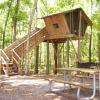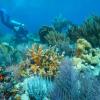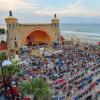By Martin Merzer
The Animals honor and reflect the joy associated with college baseball in Florida, an activity that can be affordably relished not only on the gorgeous North Florida campus of Florida State, but also on campuses throughout the state.
I am an Animal.
This can be interpreted in a variety of ways, few of them positive, but what I mean is this: I am one of the Animals of Section B, a boisterous, zealous, almost famous group of fans that supports Florida State University’s Seminole baseball team with a devotion unparalleled in the world of college baseball.
We cheer: “N-O-L-E-S. NOLES!” “N-O-L-E-S. NOLES!” We chant when our pitcher is on the brink of a strikeout: “K Time! (Clap. Clap) K Time! (Clap, Clap.)” We razz opposing pitchers on the brink of issuing a walk: “Walk him on, rag arm, walk him on. (Get a hit!) Walk him on, rag arm, walk him on. (Get a hit!)”
We adhere to an often bizarre set of superstitions, some reaching back in time, some invented as events warrant. (See below regarding my odd contribution to this and, separately, to our traditional rendition of “O Canada,” the Canadian national anthem, though only one of us is of the Canadian persuasion.)
We strategically serenade the opposition, carefully choosing selections from our official 63-song “Animals of Section B” songbook. A sample, offered to opposing pitchers who run into trouble: “Take me out of this ballgame. Take me out of here now. Put someone in who can throw the ball, my curve is flat and I can’t get a call….”
Importantly, our existence honors and reflects the joy associated with college baseball in Florida, a late-winter and springtime activity that can be affordably relished not only on the gorgeous North Florida campus of Florida State, but also on campuses throughout the state.
“Obviously, we’re fortunate in Florida to have amazing weather more often than not,” said Shannon Thomas, a Florida State baseball fan since 1989 and official leader (Zookeeper) of the Animals since 2011. “All the universities are recruiting from the same pool, the boys have all played together or against each other since they were kids, and we get to watch them bond, compete and elevate their game during their time here, and often into the big leagues.”
Florida A&M University, also in Tallahassee. The University of Central Florida in Orlando. Stetson University in DeLand. Jacksonville University. Florida Atlantic University in Boca Raton. And many, many more, right here in Florida. All have baseball programs worth supporting.
Full disclosure: At this point, I am conflicted. Generally speaking, I’d rather get hit in the head by a metal bat than mention our downstate archrivals – the University of Florida Gators (known to us as the reptiles) and the University of Miami Hurricanes (known to us in a way I have no hope of getting published).
But journalistic integrity requires me to report that both are major and intermittently successful baseball programs that their fans seem to enjoy, for reasons that totally escape us here in Tallahassee.
OK, that’s out of the way. The significant point is this: From one corner of Florida to the other, this is a brand of baseball played at a notably high level of excellence and with a purity long gone from the major leagues.
In Florida college baseball, players happily sign autographs and otherwise interact before each game with fans of all ages. Coaches can be seen teaching nuances of the game during the game. Players take the field with obvious enthusiasm.
“For me, it's watching kids come in as freshman and watching the maturation process over the next few years,” said Ken Lanese, an Animal, along with his wife, Betty, since they moved to Tallahassee in 2010.
“In major league baseball, they arrive grown men,” Lanese said. “In the minors, you may get to watch them for a season unless they get promoted or demoted to a different level. In college ball, you get to watch 18-year-old boys leave in three or four years as completely different players than when they arrived.”
Under the leadership of Mike Martin, the Florida State Seminoles’ head baseball coach since 1980, every player runs out grounders. No one sulks on the field after an error or a bad break. No one gets too demonstrative after smacking a home run, and no one shows up a rival or disses a teammate, even through body language.
Camaraderie and, yes, collegiality are the hallmarks of a Seminole baseball team, including this year’s edition, which features football Heisman Trophy winner Jameis Winston as a relief pitcher/closer, designated hitter and occasional outfielder.
All for one and one for all. It’s a refreshing sight. And it works. Nearly every year, the Seminoles make it to the NCAA regional or superregional playoffs, and they often travel to Omaha for the College World Series.
This sort of thing is inspiring in these modern times, and it generates a profound sense of loyalty. Even my wife, Marion, a previously indifferent baseball fan, has caught the fever and is an Animal. Once, late in the season and tempted by inertia, I suggested that maybe we stay home and miss a game. “No. Absolutely not. No way,” Marion said. “We have to go support our boys!”
One secret to the team’s success? Dick Howser Stadium, perfectly proportioned for baseball, covered with manicured natural grass, located on campus, just north of FSU’s tall, stately football stadium. Named for a former Florida State and professional baseball manager, Dick Howser Stadium offers 6,700 seats, many of them shielded from sun and rain, free parking, surprisingly tasty food and drink (sorry, no alcohol – this is college baseball), and a cheerful, we’re-all-here-to-enjoy the sport atmosphere.
“In Tallahassee, baseball is a bit more intimate and accessible,” said Thomas, whose husband, Stephen, also is an Animal. “From Fan Day [when players sign autographs for hundreds of fans before the season starts], to kids being able to run the bases every Sunday, to being able to watch batting practice, Howser provides a fun and safe environment.”
Also key to the Seminoles’ success: passionate fan support, including the almost over-the-top support expressed by us, the Florida State Animals of Section B.
“Florida State baseball is built on tradition and pride,” Coach Martin, known to local fans simply as “Eleven,” the number he wears on his back, wrote in a letter to the Animals. “Our goal is to do our best to continue the tradition that was started in 1948. The Animals of Section B help create an atmosphere that is second to none in college baseball.”
Determining the number of Animals is something of a work in progress. Thomas said 73 season tickets were bought by the group for the 2014 season, but that doesn’t count 13 children (“Baby Animals,” including my two grandchildren, complete with their own Baby Animals T-shirts) and other fans who find their way to our section from their officially purchased seats.
“Even some of the fans who just sit close to our section consider themselves Animals,” Thomas said. “Any time former Animals or ‘Noles in general come to town for games, we always try to find them a seat in the section.”
Kevin Delgado and his wife, Jennifer, have been Animals since 2003. If Thomas is our head coach, Delgado (known to most of us as “Fluffy”) is our third-base coach, flashing us signs throughout the game, leading most of the cheers.
“The most special thing about the Animals is the fact that the group is composed of people from many different walks of life who might not otherwise mingle,” Delgado said. “Yet, we all manage to get along pretty well and have a good time.
“Our long-developed portfolio of cheers, songs and traditions sets us apart from other groups of fans,” Delgado said. “There are only a handful of college baseball programs that have something in the same league as Florida State has.”
Reaching a few years beyond Martin’s tenure, the Florida State Animals were formed in 1977. Six years later, when Dick Howser Stadium opened, the group claimed Section B, just on the first-base side of home plate. A subsequent reconfiguration changed the section designations from letters to numbers, but never mind. We’re still the Animals of Section B. The team acknowledges this by leaving a painted “B” on one nearby girder; we bring our own magnetic “B” for the other girder.
The Animals’ motto is “Keep it Clean and Classy,” though we sometimes step right up to the line – or just a toenail over it, depending on how well lubricated some of the guys in the back rows become at the pre-game tailgate gathering.
We really do try, however. Relatives and friends of our players, and sometimes opposing players, sit in our area – and we’re keenly aware of that.
We strive to demonstrate good sportsmanship, routinely applauding opposing players who make outstanding plays. A visiting pitcher never leaves the mound after his performance without a round of applause from the Animals and most other Florida State fans. In fact, after nearly every home series, visiting players or their relatives tell us they truly enjoyed the atmosphere that all Florida State fans helped create.
“The Animals are good sports,” Lanese said. “We keep things as classy as the team we represent. Everything is PG rated because we not only realize there are kids and families at the ballpark, but the Animals represent Florida State. We would never want anything to reflect negatively on the university.”
That said, we’re adamant in our support of the Seminoles. Often, this is expressed through a variety of sometimes puzzling superstitions. For instance, take “O Canada.” We sing it during every game, just before the Seminoles come to bat in the fifth inning.
Why? Glad you asked. Way back in olden times (during the 1988 Winter Olympics in Calgary), a few bored Animals began humming the Canadian national anthem they’d been hearing so often on TV. Lo and behold, the Seminoles immediately rallied, came back from a deficit and went on to win the game.
Every baseball fan knows that you don’t mess with mojo like that, and so it began, and it endures to this very day, no matter what.
Ahead or behind. Night or day. Light rain or shine. We unfurl a huge Canadian flag and sing “O Canada’ before the ‘Noles come to bat in the fifth. Look for it when you’re at the game or watching on ESPN. TV sportscasters love to show it, though they usually botch our rationale.
We even did it earlier this season, on the same day that Canada defeated the United States 1-0 in a dramatic men’s Olympic hockey semifinal. Acknowledging the obvious, Delgado – who punctuates each rendition of “O Canada” with a timely shout during a built-in moment of silence – bellowed, “AWKWARD!”
My modest contribution to this compendium of superstition came during the 2013 season, when a Seminole player demonstrated a disturbing tendency, with men on base, to meekly ground out to second, smothering rallies through a series of double plays.
Finally, no longer able to watch the inevitable, I turned my back – and, naturally, he came through with a solid hit that scored two ‘Noles. I subsequently was forbidden from watching him come to bat in such circumstances, with fellow Animal Nate Bruce, sitting two rows behind me, assigned to mime balls and strikes and other developments on the field, so I could, sort of, follow the action.
Experiences such as those add to the sheer joy of watching college baseball at Florida State in Tallahassee and on so many other campuses in Florida.
“All of this is rooted in the passion that people have for their alma maters,” Delgado said. “You see it every Saturday with college football, but baseball manifests this in its own unique way. It is more civil, more classy, but no less passionate.”
Here is how I explain it to visitors:
I am sufficiently old to have seen the Brooklyn Dodgers play at Ebbets Field. I have attended hundreds of major league games in New York City, Miami, Chicago, Baltimore, Los Angeles, Washington, D.C., and elsewhere. As a reporter, I’ve covered two World Series.
And this is the absolute truth: I have never had as much fun at any of those games as I have every single time I attend a college baseball game right here in Tallahassee.
“It is far and away the best bang-for-your-buck of the paid ticket sporting events that I have attended,” Delgado said. “Generally easy access, and free parking. User friendly for both the very young and the very old, and the tickets don't leave me with sticker shock. And it doesn't hurt being part of the best group of fans in the sport, of course.”
You betcha. Give it a try. You’ll see what we mean.
If you go…
Dick Howser Stadium is part of a sweeping collection of athletic facilities found along the western edge of Florida State University’s campus in Tallahassee, roughly at the intersection of West Pensacola Street and Champions Way. Look for the tall, stately football stadium and then shift just a bit north. Parking is free and abundant.
Box seats and all other seats in the covered grandstand are sold out long before each season begins, though you often can legally buy tickets from individuals who roam just outside the gate. Face value for these reserved seats is $15 per ticket.
Unreserved bleacher seats along the first and third base lines can be purchased in advance or, if any are left, on the day of the game. Price: $7 for adults, $5 for children 5-18 years old. Kids four years old and younger are free.

Before the game, football and baseball star Jameis Winston autographs a visor for a young Florida State University fan at Dick Howser Stadium in Tallahassee.
- Colin Hackley for VISIT FLORIDA

With the K’s on the post behind them tallying strike outs, the Animals of Section B cheer – no, they give it their all – for Florida State at Dick Howser Stadium in Tallahassee.
- Colin Hackley for VISIT FLORIDA
RELATED CONTENT
Florida Stories: A Walking Tour of Tallahassee
- 3 minute read
By Tom Scherberger Want to explore the cultural, historical, and architectural treasures of Tallahassee, Fla.? Just go to Florida Stories Walking...
Original Florida Roadside Attractions & Retro Theme Parks
- 13 minute read
Escape the long lines and crowded theme parks. These Florida roadside attractions are just as fun but offer unusual twists ranging from shrunken...
Your Guide to Disney’s Animal Kingdom Theme Park at Walt Disney World Resort in Orlando
- 11 minute read
By Lauren Tjaden In a heady combination of rare animals and wild entertainment, Disney's Animal Kingdom® Theme Park at Walt Disney World...


























